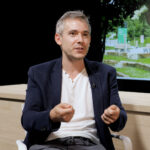I think it is important for me, when I approach people I want to work with, to be able to explain why I want to work with them. And so, not to compartmentalize scientific dimensions; they are not just objects of study for me, but people with whom I will have conversations that may lead us to develop more formal research projects.
Hello, my name is Baptiste Godrie. I am a sociologist and a professor at the School of Social Work at the University of Sherbrooke. I was trained in a research center on social inequalities in Montreal, which led me to become interested in citizen participation, user involvement, and the recognition of knowledge—both their knowledge and the knowledge of professionals. So, what knowledge do they already possess, how is it mobilized, and what are the power dynamics that determine its recognition and validation in various environments?
I have worked in the field of mental health, where I questioned the recognition of knowledge derived from the lived experiences of people with mental health issues, particularly in relation to the medical establishment. Currently, more specifically in the field of poverty alleviation, I am focusing on the knowledge derived from the lived experience of poverty and how this knowledge is mobilized and recognized in public policies aimed at fighting poverty.
The way we differentiate between various types of knowledge is a major topic of debate right now because these boundaries are constantly shifting. The current boundaries are not the same as they were twenty or fifty years ago. With the emergence of this category of experiential knowledge, forms of knowledge that were previously invisible or dismissed as folklore, tradition, or anecdotes are now being recognized as legitimate knowledge. This represents a transformation of the epistemological status of these forms of knowledge.
However, there are power struggles inherent in recognizing this knowledge. One of the most common misunderstandings when trying to categorize different types of knowledge is adopting a divisive or essentialist view—as if academics hold scientific knowledge, people with lived experiences hold experiential knowledge, and professionals (such as those in healthcare or social services) hold professional knowledge. I believe this perspective recreates silos and antagonism and offers a very simplistic view of reality. In practice, these different types of knowledge coexist within every individual in both equal and unequal ways.
For example, consider the know-how developed to resist domination or oppression: the ability to negotiate with power, protect oneself from violence, and find creative ways to circumvent authority. These are forms of experiential knowledge—fragile and often informal—that are sometimes shared privately and that cut across different categories of knowledge.
In my fields of research—health and social services and the fight against poverty—many intervention practices would not have emerged without the contribution of the knowledge of the people directly affected. This includes harm reduction approaches, community health initiatives, supervised consumption sites, and in mental health, practices like self-managed medication and hearing voices groups. These approaches originate from people’s concerns, their definitions of reality, and their needs. Together with them, we have designed institutional solutions that address those needs.
At the same time, this idea of experiential knowledge contributing to interventions or scientific inquiry also raises an important question for me: how relevant is our research to the communities we study? Beyond academic career concerns—where we are expected to publish in peer-reviewed journals—how can we make our research as meaningful and useful as possible?
In research methodology, we often talk about “data collection” as if we are simply gathering information. But this language needs to be questioned. What are we actually doing when we collect people’s stories and life experiences? We analyze them and produce something new. But who owns this knowledge we produce? How do we return it to the people who shared it with us? Some participants may feel that researchers appropriate their voices for academic careers.
This reflection on the extraction and processing of data is central to my current work. One way to address these dilemmas is to engage in open conversations with research participants. Today, when I am invited to conduct research or approach groups—whether in mental health or poverty alleviation—I prioritize dialogue about expectations for the research. People often want their knowledge and practices to be recognized and validated, and they want to maintain control over how their knowledge is used.
As academics, this compels us to find ways to support participants’ involvement in the research process—through material means, financial support, and shared decision-making. For example, who owns the data? Do participants want to be involved in the analysis, and if so, how can we facilitate that involvement?
Over the past fifteen years, I’ve seen how social science education has evolved. Today, research methods courses are more likely to address these issues directly—although not enough, in my view. I advocate for these questions to be more central in master’s and doctoral training. It’s insufficient to talk only about “data collection”—we must discuss co-producing knowledge with research participants.
In my research practice, science and ethics are inseparable. Ethics should not be limited to formal consent procedures or protecting vulnerable participants. The deeper ethical issues involve the dilemmas and paradoxes of documenting fragile, subversive forms of experiential knowledge. Without careful discussion of what knowledge we expose and to whom, research can perpetuate control and surveillance over marginalized groups.
This does not mean that all research must be participatory. But it does mean that even non-participatory, critical research can and should be in dialogue with the communities it studies. For me, addressing these questions is an essential and ongoing project for every social scientist.

